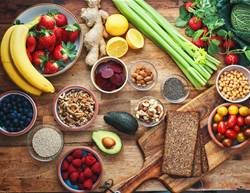If lazy days and endless trays of indulgent food were the hallmark of your holidays — it sounds like the perfect break! Trouble is, all that festive food can upset gut health.
“As well as being devoid of the nutrients that support good gut health, high intakes of ultra-processed or rich foods can also displace plant foods in our diet, which we need for a diverse and thriving gut microbiome,” says dietitian and nutritionist Rebecca Gawthorne.
And given how important a healthy gut is for overall health and wellbeing, helping it thrive is a must-do. “Good gut health is linked to reduced gut symptoms, like abdominal pain, and gastrointestinal diseases,” says Rebecca. “But taking care of gut health is also linked to improved mood, a stronger immune system, more energy, healthier skin and a reduced risk of chronic diseases, like type 2 diabetes.”
7 things you can do to help your gut health flourish
1. Eat a wide range of healthy foods.
Research suggests that a gut-healthy diet is one that’s not only full of plant-based whole foods — that’s things like fruit, veggies, legumes, wholegrains and nuts and seeds — but that also contains a broad variety of those foods.
Proof? Study results show that people who eat 30 different plant foods a week have a much more diverse population of gut bacteria than those who eat just 10 types of plant foods weekly. “And the more diverse our gut microbiome,” says Rebecca, “the better for overall health.”
2. Eat more fibre.
“Fibre is the number one nutrient for gut health, and the latest research confirms that quality fibre consumption requires a mix of dietary fibre types for a healthy gut microbiome,” says Rebecca.
These fibres include:
- Soluble fibre – the type that soaks up water and is found in fruits and vegetables, legumes, soy products and barley.
- Insoluble fibre – the type that doesn’t absorb water and is found in the skins of fruits and vegetables, nuts and seeds, bran and wholegrain foods.
- Viscous fibre – a type of soluble fibre that dissolves to form a gel in the gut. Food sources include oats, legumes and citrus fruits.
- Prebiotic fibre – which passes undigested into the large intestine, where it encourages the growth and activity of beneficial gut bacteria. Food sources include certain fruits and vegetables, such as garlic and onion, asparagus, sweetcorn, fennel, watermelon, grapefruit and nectarines, as well as chickpeas and lentils, oats, couscous and rye bread, and cashews and pistachio nuts.
“Unfortunately though, most Australian adults aren’t hitting the recommended daily fibre targets of 25g for women and 30g for men.” If you’re not getting enough fibre in your diet, a natural supplement that includes the four fibre types can help you reach the recommended daily intake.
3. Swap ultra-processed foods for fresh fruit and vegetables.
As you’ve already read, it’s fruit and veggies that deliver a big hit of that all-important fibre — in many cases, all four types of it. Trouble is, only 6% of us are eating enough of both, each day. Strive to eat two serves of fruit and at least five or six serves of vegetables every day.
4. Cut back on alcohol and red meat.
Studies link consuming too much of either to negatively impacting the makeup or the natural by-products of gut bacteria. While the Heart Foundation recommends eating no more than 350g of unprocessed, lean red meat a week, if you drink alcohol, official guidelines advise drinking no more than 10 standard drinks a week.
5. Get your sleep back on track.
Research suggests running low on sleep disrupts your gut’s ratio of healthy-to-unhealthy bacteria. National Sleep Foundation guidelines recommend aiming for between seven and nine hours of sleep each night.
6. Exercise daily.
Regular physical activity does two things for gut bacteria — the volume of the healthy varieties increases, while levels of less-healthy types fall. Make moving a daily habit, if it’s not already.
7. Create a microbiome-friendly morning routine.
With a little planning, you can tick a few gut-health boxes first thing in the morning, every morning. Get up at the same time each day, a habit that promotes a good night’s sleep by maintaining your circadian rhythm; go for an early morning walk; and enjoy a fibre-rich breakfast to feed those good gut bacteria.
This handy guide was brought to you in partnership with Nu-Lax who have been looking after people’s digestive health for over 80 years.










